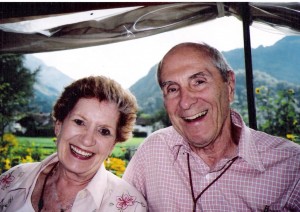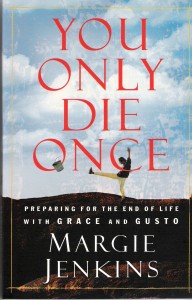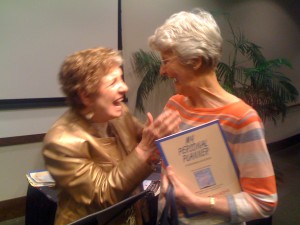
Margie Jenkins (left)
Margie Jenkins is nationally recognized for her work with end-of-life planning issues. She has worked for decades as a therapist, and she presents seminars across the country on this topic.
In her highly praised book, You Only Die Once: Preparing for the End of Life with Grace and Gusto, Margie calls on readers to talk about this taboo subject in order to live a more fulfilling life and be prepared for a quality end-of-life. I had the opportunity to talk with Margie about how we can better approach this conversation.
Dana: What prompted you to write your book, You Only Die Once?
Margie: I’ve been a therapist for over 30 years, and I see people who are going through changes in their lives. One of the gorups I see are people going through end-of-life issues, and I found that most people don’t know how to prepare. I was doing seminars on this subject around Houston. People were asking for a book, so I wrote a book, then followed with the workbook [My Personal Planner].
 Then we did a video of a presentation that we did, Don’t Slam the Door on Your Way Out. My husband and I have traveled around the coutnry and given over 150 presentations on this subject.
Then we did a video of a presentation that we did, Don’t Slam the Door on Your Way Out. My husband and I have traveled around the coutnry and given over 150 presentations on this subject.
Death is the last taboo — it’s a touchy subject. And I’m trying to bring it out of the closet. My mission is to try to help people make end-of-life decisioins before they get there. They can make wiser decisions and save money, and it can be an enjoyable journey if they plan ahead of time.
A lot of people think there’s not much to it, but a lot don’t realize there are about 150 decisions that need to be made at the time of a death, and people who are dealing with a death usually are emotionally involved and rushed and don’t make wise decisions. Sometimes they really get confused by all of the options.
I’m trying to get people to write down their wishes before the end of life, and I’m also encouraging people to live bodaciously.
Dana: What exactly do you mean when you say “live bodaciously”?
Margie: To live life to the fullest, put more joy in your life, to make your life more satisfying. I feel like our lives are so busy today, that I think we often forget about the things that bring us joy and things that really can be exciting and fun-loving.
Think of what are the activities that bring you joy and remember to do them! As we age, people forget to the things that bring them joy.
Dana: Why do you think people leave behind those activities with age?
Margie: A lot of people don’t really evaluate how they’re using their time. They get so involved in what they’re doing and their “have-to” list is so long, they don’t get around to thinking what would be fun. When I ask people “What do you do for fun”, they say “I don’t have time for fun”. They don’t have time to think about it. A lot of people don’t even know what it would be.
Dana: And the book and planner help people do that, right? It’s not just and end-of-life or funeral planner, but a guide to living a good life and a quality end-of-life experience?
Margie: Yes. I have a whole list of things that I think are subjects that need to be thought about for end-of-life planning. I suggest that people “shop before they drop” — we shop for everything else we buy, and I think we should do that for end-of-life choices. One of the things on that list is living bodaciously — doing the things you want to do before you die.
A lot of people think this conversation is just for old people. Someone once asked me, “When is a good time to talk to my kids about death?” I said “When is a good time to talk to your kids about sex? You don’t wait until your kid goes out on a first date.” It’s the same with death. You don’t want to wait until it’s happening (or has happened) before you talk about it.
I hope to encourage everyone to lighten up about this important subject, talk about it, plan for it, and live bodaciously as long as you can. Add more joy, create a life that is more satisfying. Remember activities that used to bring you joy and begin doing them again and try new adventures that are exciting and rewarding. Travel to new places, visit friends you have lost touch with, write notes to people and let them know you appreciate them. Let go of things that are no long satisfying, make room for things are are more fun.
Dana: Who should read your book?
Margie: People who know they will die someday or know someone who will.
Dana: What do you think holds people back from having this conversation and planning ahead?
Margie: People are uncomfortable for several reasons. I believe most people don’t realize their own significance nor the affect their death will have on those who love them. And people don’t know that making end-of-life plans can be an enjoyable journey.
It is a strange phenomena that we all know we will die someday but no one wants to talk about it or plan for it. When I was writing my book, I sent chapters to our four kids asking for their comments and suggestions. They all wrote back to stop sending them this stuff and stop writing about dying. I didn’t stop and now they call and say, “Mom, we just went to the best funeral. You would have loved it.”
My dad lived to be over 100 my mother lived to be 90 and both were willing to talk about the subject, so I’m very fortunate in being comfortable with it.
A lot of people think that if they talk about it they’ll make it happen.
Dana: Like that makes it a reality?
Margie: Yes, like you’re being very pessimistic. Some cases, kids don’t want to talk about it with aging parents, or the other way around. People think of it like a secret or something. Pepole don’t know how to plan for it because it isn’t talked about. People are afraid to plan for it for fear of making people think they’re terminally ill or something.

Margie with a seminar attendee
So,it becomes a subject that people are hesitant to talk about for several reasons: They don’t know how to begin, they don’t think there’s a need [because of their age]. But, I see clients age 9 to 90 who are dealing with death.
I had a client once whose mother was ill. She was afraid to talk to her mother about it, because she didn’t want to upset her. One day, I spoke to them together, and I said to the mother, “What does it feel like to know you’re dying?” The client was taken aback by this, but she told me later that it broke the ice, and she and her mother could now talk about a lot of other things, as well. Apparently, her mother had also been avoiding the conversation, because she was worried about upsetting her daughter. People worry that it will upset family members to talk about their death. They end up protecting each other and never have the conversation, because each is worried about the other.
Dana: Do you suggest people speak so frankly? Is that what we’re missing?
Margie: I think there’s lots of ways that we can do it. One of the things I’m trying to get people to do is fill out this Planner and tell their family that they’re making their decisions now, and this can initiate the conversation.
I think we need to lighten up about this conversation — I suggest that people create an end-of-life file and name it something that reflects them. For example, I had a golfer who called his his “19th hole”, a choir singer who called hers her “final chorus”, one guy named his “dead end”, my husband and I call ours our “Going Away Party”; and everyone knows where it is, and they can ask questions if they have them. This is a way you can start this process and begin talking about it.
Some subjects are easier to talk about than others — cherished posessiions are one of those. Everybody has things and photographs that have a special meaning to them, but don’t tell the story and nobody knows why that’s valuable. Start there. Put names and dates on photographs and talk about things, where they came from and why they’re meaningful.
Dana: So we can broach the subject through these simpler topics, but what you do is encourage people to continue it from there.
Margie: Right. And in the Planner I also have a medical crisis form, a section called “What You Should Do When Death Occurs”. If you can fill that out and have some sense of the steps to take — advanced directives, will, etc. There are so many decisions to make at the end of life that many people just get overwhelmed.
I’m trying to get people to lighten up and talk about their memories and lessons they’ve learned as well, in order to pass those on. There’s a section “Springboards to Bodacious Living”, which is things that you need to add to your life or let go of in order to live life more fully.
Dana: Is there anything else you’d like to share with our readers that I haven’t mentioned?
Margie: I want to suggest to people to live life to the fullest as long as you can and to finish well and make plans ahead of time to reduce the burden and suffereing of the people you love and to make better decisions. We often talk about being in charge of our life, but we can also be in charge of our death. My hope is to help people feel comfortable talking about this and know what their options are.
Learn more about Margie and her books at margiejenkins.com.

 What is End-of-Life Planning? Interview with Margie Jenkins
What is End-of-Life Planning? Interview with Margie Jenkins


 “As Tears Go By” by Marianne Faithfull
“As Tears Go By” by Marianne Faithfull

 Funeral Favors Offer Visitors a Tangible Memento
Funeral Favors Offer Visitors a Tangible Memento















